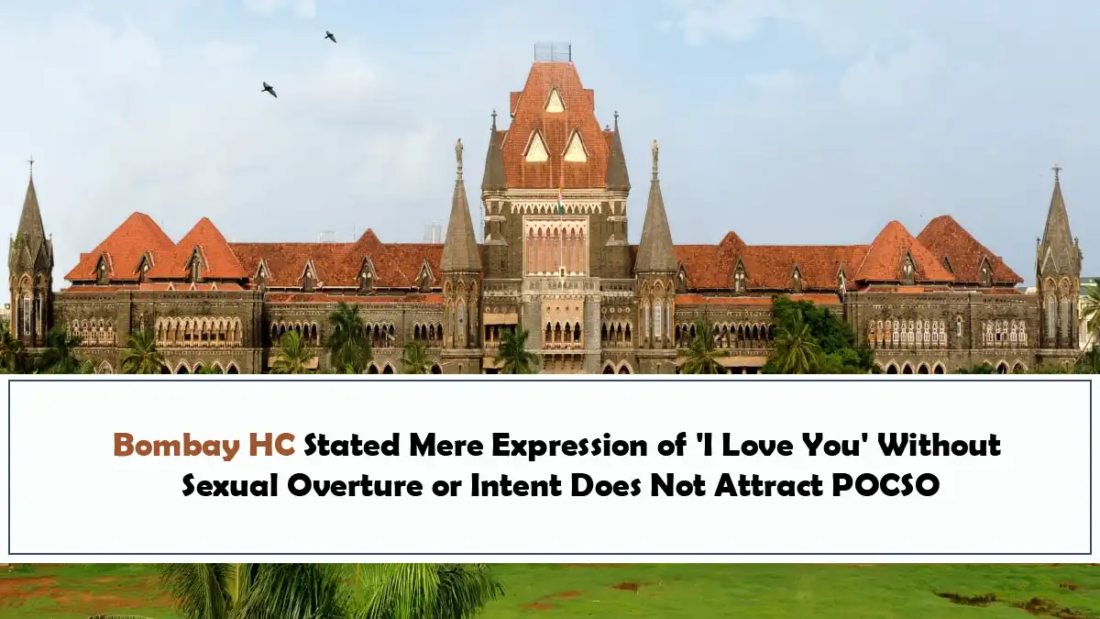Facts of the Case
The case arose from a complaint filed by the family of a minor girl who was allegedly sexually harassed by the accused while she was returning home from her tuition class on October 23, 2015. According to the FIR, the accused approached the girl on his motorcycle, told her “I love you,” and insisted that she reveal her name. Disturbed by the interaction, the girl informed her parents, which led to the lodging of an FIR and initiation of criminal proceedings.
The accused was tried under provisions related to sexual harassment and was convicted by a Sessions Court in Nagpur on August 18, 2017. He was sentenced to three years of rigorous imprisonment and fined ₹5,000. The accused challenged this conviction before the Bombay High Court (Nagpur bench), claiming that the act lacked any sexual intent and thus could not constitute sexual harassment under the law.
Contentions of the Petitioner
The appellant contended that the sole act attributed to him saying “I love you” and requesting the girl’s name did not involve any form of sexual overture, physical contact, or suggestive behaviour. His counsel argued that for a charge of sexual harassment to be sustained, the alleged act must be coupled with “sexual intent” as required under Section 11 of the Protection of Children from Sexual Offences (POCSO) Act or relevant IPC provisions.
It was emphasized that the statement was made only once, and there were no further actions, repeated contacts, or gestures that could reasonably indicate a sexual motive or intent. The appellant sought quashing of the conviction on the ground that the prosecution had failed to prove that the accused’s words or conduct amounted to an act of sexual harassment within the legal meaning of the term.
Contentions of the Respondent
The prosecution supported the Sessions Court’s conviction and submitted that the accused’s sudden approach, unsolicited declaration of affection, and demand to know the girl’s name were sufficient to cause fear and discomfort, especially given the victim’s status as a minor. It was argued that the overall context should be considered while assessing whether the act amounted to sexual harassment.
The prosecution further contended that minors are particularly vulnerable and that the accused’s actions must be viewed through the lens of the impact on the victim rather than the accused claimed intentions alone. They asserted that the expression “I love you” could reasonably be interpreted as having a sexual undertone when unsolicited and directed at a young girl in public.
Court’s Observations
Justice Urmila Joshi-Phalke, sitting as a single judge of the Nagpur bench of the Bombay High Court, observed that the central question was whether the phrase “I love you,” uttered in isolation and without accompanying acts or words, could amount to sexual harassment under the law. The Court emphasized that under both POCSO and relevant IPC sections, the existence of “sexual intent” is essential to constitute the offence.
The judge noted that the prosecution’s evidence did not indicate that the words were spoken with any sexual motive. Importantly, the Court clarified that mere utterance of affectionate words without more does not by itself reflect “sexual intent.” Justice Joshi-Phalke stated:
“Words expressed ‘I Love You’ would not by itself amount to ‘sexual intent’ as contemplated by the legislature. There should be something more which must suggest that the real intention is to drag in the angle of sex, if the words uttered are to be taken as conveying sexual intent.”
The Court further explained that sexual intent is a question of fact and must be inferred from surrounding circumstances and behaviour. “Intention is the inner compartment of the mind,” the judge observed, and it must be supported by corroborative material to draw legal conclusions.
Court’s Order
On examining the evidence, the Court held that the accused’s conduct did not demonstrate the kind of sexual intent required for an offence of sexual harassment. Accordingly, the High Court quashed and set aside the Sessions Court’s judgment dated August 18, 2017, which had sentenced the appellant to three years of rigorous imprisonment.
The appeal was allowed, and the accused was acquitted of all charges. The Court reiterated that mere expressions of love, unaccompanied by acts or conduct suggesting sexual desire or coercion, cannot be criminalized under the framework of sexual harassment laws. The judgment thus reaffirmed the principle that criminal liability must be based on proven intention and effect, rather than inference from isolated words devoid of context.
Written by Adv. Deeksha Rai
 Cart is empty
Cart is empty 

